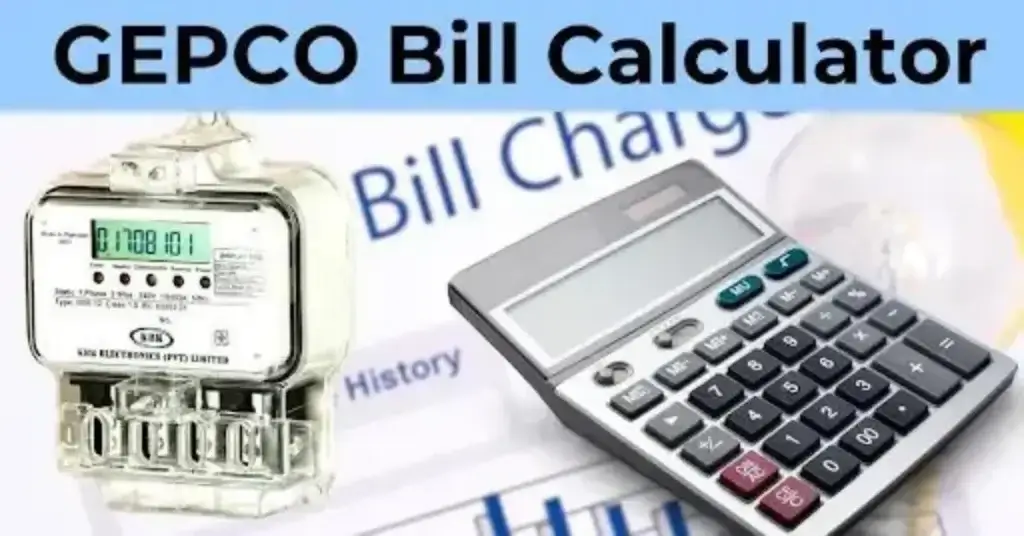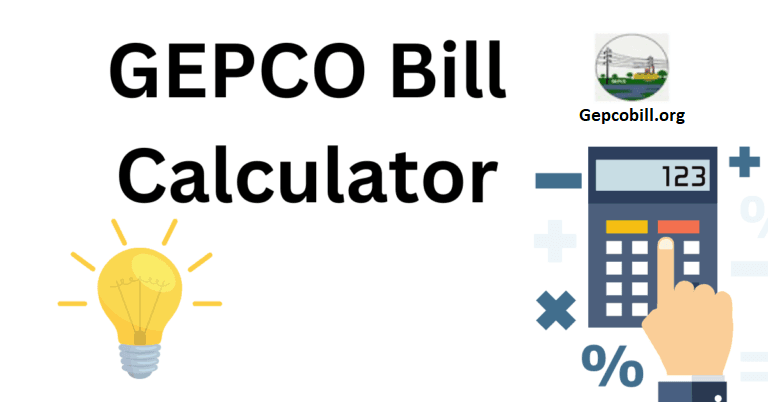GEPCO Bill Calculator - Electricity Bill Estimator
GEPCO, short for Gujranwala Electricity Supply Company, stands as a key player in Pakistan’s electricity supply landscape. Like many sectors in Pakistan, the power domain is struggling with the effects of inflation, which drives up Gepco unit prices. With the prevalent use of air conditioners and home appliances, electricity bills often go up, especially through online calculation tools, requiring a vigilant approach to monitoring consumption and managing the bill.
In Pakistan, GEPCO determines bills based on several factors including units used, type of meter, and various other considerations, often adding technical terms to the billing process. Understanding these terms is important to get an accurate bill estimate, especially when using the GEPCO Bill Calculator. This online tool serves as a handy resource, which simplifies the task of estimating your electricity bill significantly.

What is GEPCO Bill
A GEPCO bill includes charges for electricity used by households or businesses, as well as various taxes and service fees. The bill also provides information about the meter reading, past balance, and due date of payment. Customers can pay their bills in various ways, such as online payment, bank transfer, or at designated payment centers. Paying bills on time is important to avoid the disconnection of electricity services. Consumers can also contact GEPCO Customer Service for any queries or complaints regarding their bill or electricity services.
How Online Bill Calculator Works
To use the GEPCO Bill Online Calculator, simply enter the number of units you have used in the designated field. The calculator will then provide you with the electricity price per unit and the total bill amount based on your input. This can help you plan according to your budget and avoid any surprises when your actual bill arrives.
Note that this tool provides an estimate and the actual bill amount may vary slightly based on factors such as taxes, surcharges, and any additional fees. It is always recommended to check your original bill for the most accurate information.
So, the next time you want to know about your electricity bill or get an estimate before it arrives, try the GEPCO Bill Calculator. It’s a handy tool to help you manage your costs and stay on top of your electricity usage.
Note: Please note that your calculated bill amount may differ from the actual bill amount.

GEPCO Unit Rates
Before you examine GEPCO bills, it is important to understand a few technical terms. Here’s a treat for you.
➫ 1- Knowing your connection type
First, it’s important to know what type of connection you have. If you’re not sure, don’t stress. You can easily find this information on your electricity bill.
GEPCO Tariff Options
For accurate online bill calculation, it is necessary to select the appropriate tariff option in the calculator. Choosing the right one ensures that you get the right results for your situation.
| TARIFF NAME | TARIFF TYPE |
|---|---|
| A1(01) | Domestic |
| A1(03) | Domestic |
| A2(04) | Commercial |
| A2c(06)T | Commercial |
| B1(07) | Industrial |
| B1(08) | Industrial |
| B1b(09)T | Industrial |
| B2a(10) | Industrial |
| B2a(11) | Industrial |
| B2b(12)T | Industrial |
➫ 2- Choose Your Phase Type.
You must choose from the following options:
- Single phase
- Three phase
Single phase
These are the meters commonly found in homes, which run on a voltage between 230 and 240 volts. They are connected by only two wires – active and neutral wires.
Three phase
These are robust meters commonly found in industrial environments such as factories and large businesses. Operating at voltages ranging from 410 to 430 volts, they use three active wires with a neutral wire for connection.
➫ 3- Recording the number of units used
Now, it’s time to note down the amount of units you used during the month. You have the flexibility to enter this data in one of three formats.
kilowatt Hour
A kilowatt hour (kWh) measures the energy consumption of electrical appliances rated at one kilowatt (KW) over one hour. Simply put, it tells you how much energy your home appliances use in one kilowatt-hour.
Kilovolt Amperes Reactive Hours
Kilovolt-ampere reactive hours (kVARH) are used to measure the power rating of heavy-duty electrical equipment.
Maximum Demand Indicator
A maximum demand indicator tracks the amount of energy consumed by a consumer at a specific moment in time.
➫ 4- Peak Hours
Additionally, you’ll notice that below each of the previously mentioned input fields, there are two separate types of unit fields.
Peak hours refer to specific times of the day when the price per unit of electricity increases, usually lasting about four to five hours. During these peak hours, energy consumption is significantly higher than during the rest of the day.
Off-Peak Hours
Off-peak hours refer to times when electricity usage is lower than during peak hours. These periods are when demand is low, and typically have lower electricity usage rates than peak times.
➫ 5- Meter Rental
Going forward, if applicable, make sure to enter the meter fare.
Note: Meter rent is a fee charged to customers every quarter, which is meant to cover meter-related expenses.
➫ 6- Service Hire
Then, if necessary, fill in the Service Fee field.
Note: The service charge is a volumetric charge based on a kilowatt hour that covers the cost of delivering electricity to your residence, including the use of local wires and other associated equipment.
➫ 7 – Your Delivery Area
Enter your power supply area in the designated field.
➫ 8- TV set in use
Moving on, please enter the total number of television sets currently in use. You will get a drop-down menu with options allowing a selection of 9 TV sets.
➫ 9- Tax Exemption
Additionally, several additional fields are available. You can choose to select or deselect them based on your needs.
- STRN is available
- Sales tax is exempt for retailers
- ED exception
- Exempt from GST
- Exemption from IT
- Exemption from e-tax
- Additional sales tax on the marble and granite industry
How To Use Online Bill Estimator
To use the GEPCO Electricity Bill Calculator effectively, you will need to enter the following details in the online tool.
Meter Reading
Either enter the meter reading from your previous bill or the current reading displayed on your meter.
Rate Per Unit
Provide the rate per unit, as specified in your bill (usually indicated in Rs/kWh).
Total kWh Usage
Calculate the total kilowatt-hours (kWh) used for a given period (for example, for a monthly electricity bill, select a period of 30 days and calculate the total kWh used (multiply the values given above).
GEPCO Bill Calculation Formula
Monthly electricity bill = watt hours x cost per kilowatt hour (kWh)
Bill Calculation Method
Given that 1 unit equals 1 kWh, you can determine the total kWh using the following calculation:
1000 W × 24 hours × 30 days = 720,000 watt-hours
1000 W × 24 hours × 30 days = 720,000 watt-hours
To convert this to kWh, simply divide 720,000 by 1000, which will result in 720 kWh.
Therefore, the total monthly average consumption is 720 kWh. With an approximate unit cost of around PKR 25, you can calculate the total cost using the formula provided above:
Monthly electricity bill=720×25=18000
So, the approximate monthly bill would be an average of PKR 18000.
Extra Tips
Pro tip- For non-filer customers, a 7.5% tax is usually added to their monthly electricity bill, increasing the total amount due. To check whether this 7.5% tax is included in your bill, you can verify your CNIC (Computerized National Identity Card) with PITC (Power Information Technology Company). Just visit the official website of PITC and update your CNIC details in the specified fields for verification.
Conclusion
We have provided detailed instructions for each field in the GEPCO Bill Calculator. After entering all the necessary information, simply click the Submit button, and you will receive an online estimate for your GEPCO bill. This calculator is designed to give you an estimate of your monthly charges, focusing solely on the cost of electricity without factoring in tax.
It is important to note that taxes may vary and are subject to various factors such as government decisions, surcharge calculations, or policy revisions. These factors can affect your monthly bill. Therefore, after using this tool to calculate your bill, we recommend that you wait for your official online bill or hard copy from GEPCO to ensure that you have the most accurate And have the latest information.
